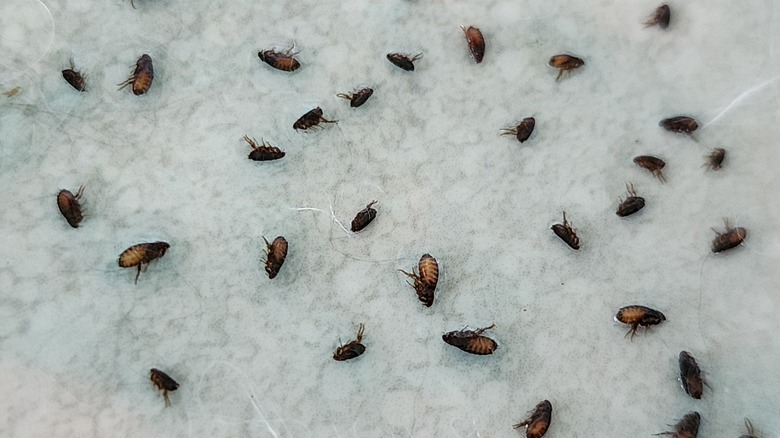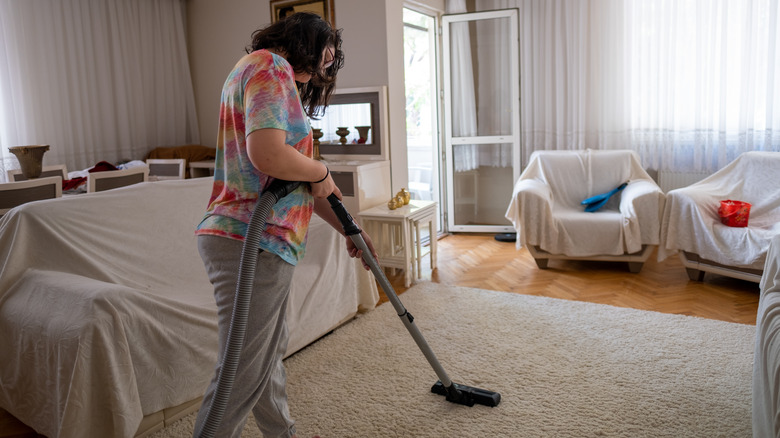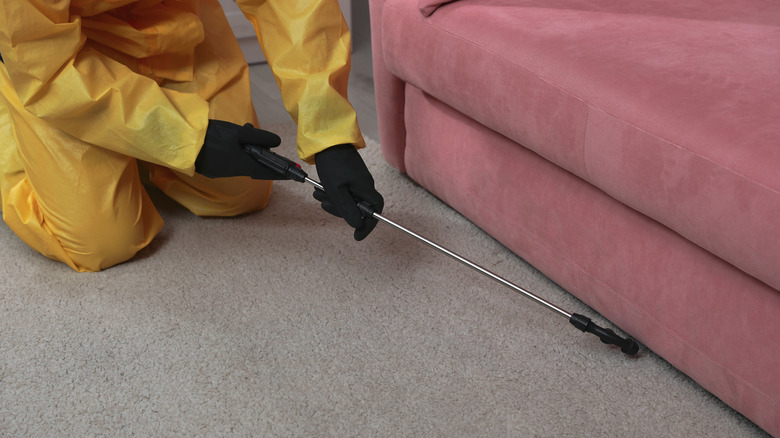Which At-Home Pest Control Options Kill Fleas & When You Should Call In The Pros
It doesn't take much to develop an infestation of fleas in your home. Even if you don't have pets, fleas can be left behind by a previous tenant, introduced by strays and rodents, or even cling to your clothing if you aren't treating your yard for fleas and ticks often enough. Unfortunately, it only takes two to tango, and an adult female flea can lay around 40 eggs per day. If just a few fleas sneak in, your rugs could be crawling with tiny, jumping fleas in a matter of days. While they're usually considered an animal pest, fleas can bite humans too, leaving itchy red bumps and even spreading certain diseases and parasites. It's crucial to control a flea problem before it gets out of hand, but calling in the pros might feel embarrassing, expensive, or unnecessary. Trying to DIY a complete flea removal is rarely successful, but vacuuming, washing bedding, and steaming furniture can help tremendously.
Fleas are a horrible nuisance to have in your home, and even after flea treatments, pets and furnishings can keep being re-infested if you don't successfully exterminate them at all stages of the life cycle. If you've come to the shocking realization that fleas have moved into your home, you might be scouring the internet for home remedies, but it's important to know the limitations. Here are the steps you should take immediately for at-home pest control and how a professional can help those bothersome buggies bite the dust.
Home remedies can give you a head start
Fleas are usually found hiding in rugs, blankets, bedding and upholstery, so one of the first things you can do to reduce the fleas in your home is vacuum. Vacuuming will remove a good amount of flea larvae, eggs, and droppings, which larvae use as a food source. Vacuuming alone won't remove all fleas, and leaves behind pupae, which attach their cocoons to the fibers before emerging as adults. However, the warmth and vibrations from vacuuming may encourage pupae to hatch, making them available to vacuum up next time or treat with insecticide. Far better than vacuuming, steam cleaning and washing blankets, pet beds, and other items in hot water (above 95 degrees Fahrenheit) are some of the most effective non-chemical means of destroying fleas, and will kill fleas at all stages of the life cycle.
Vacuuming, steaming, and washing are good initial tactics, but they're not likely to solve the flea problem on their own. To have confidence that all fleas are gone, you'll need to use a chemical treatment. Pyrethrum, boric acid, and borax are some home remedies that show promise, but an IGR (insect growth inhibitor) is necessary to stop flea larvae, pupae, and eggs from advancing into the next stage of their life cycle. You can purchase IGRs for yourself, such as Martin's I.G. Insect Growth Regulator Concentrate, available for $19.99 at Tractor Supply Co., then carefully follow the directions for use in and around your home.
Trusting the experts is usually worth it
Of all the types of bugs you don't want to find living in your home, fleas can be one of the hardest to control because they jump long distances and quickly repopulate. With vacuuming, steaming and washing, you may eventually be lucky enough to stop the spread of fleas, but they aren't always the best ways to get rid of fleas in your home. Calling a professional will give you better peace of mind. A visit from a professional flea exterminator will cost around $270 on average but could range between $75 and $400 depending on your home size. If you add together the cost of renting or buying a carpet steam cleaner, IGRs, and insecticides, you may find this exterminator fee more cost-effective — not to mention less time-consuming.
If you decide to go the professional route, vacuuming is still a wise choice to pick up some fleas, remove dirt and dander from your carpets, and make the pesticides more effective at penetrating carpet fibers. It's important to steam your carpets and furniture before applying any chemicals, as steam cleaning can reduce their effectiveness. When having your home treated by a professional, you'll likely need to remove any pets and stay out of the house for a few hours until the treatments have settled enough to safely return.


